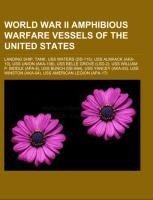
-
 Anglický jazyk
Anglický jazyk
World War II amphibious warfare vessels of the United States
Autor: Source: Wikipedia
Source: Wikipedia. Pages: 186. Chapters: Landing Ship, Tank, USS Waters (DD-115), USS Almaack (AKA-10), USS Union (AKA-106), USS Belle Grove (LSD-2), USS William P. Biddle (APA-8), USS Bunch (DE-694), USS Yancey (AKA-93), USS Winston (AKA-94), USS American... Viac o knihe
Na objednávku
37.08 €
bežná cena: 41.20 €
O knihe
Source: Wikipedia. Pages: 186. Chapters: Landing Ship, Tank, USS Waters (DD-115), USS Almaack (AKA-10), USS Union (AKA-106), USS Belle Grove (LSD-2), USS William P. Biddle (APA-8), USS Bunch (DE-694), USS Yancey (AKA-93), USS Winston (AKA-94), USS American Legion (APA-17), USS Wayne (APA-54), USS Virgo (AKA-20), USS Alshain (AKA-55), USS Thuban (AKA-19), USS Bayfield (APA-33), USS Warren (APA-53), USS Samuel Chase (APA-26), USS Sands (DD-243), USS Uvalde (AKA-88), USS Wantuck (APD-125), USS Blessman (DE-69), USS White Marsh (LSD-8), USS Weiss (APD-135), USS Barrow (APA-61), USS Seminole (AKA-104), USS Rankin (AKA-103), USS Horace A. Bass (APD-124), USS Warrick (AKA-89), USS Arneb (AKA-56), USS Zeilin (APA-3), USS LST-389, USS Algol (AKA-54), USS Manley (DD-74), USS Whiteside (AKA-90), USS Ashland (LSD-1), USS Henrico (APA-45), USS Gunston Hall (LSD-5), USS Barber (DE-161), USS Talbot (DD-114), USS Bull (DE-693), USS Pierce (APA-50), USS St. Clair County (LST-1096), USS Barnett (APA-5), USS Alcyone (AKA-7), USS Alpine (APA-92), USS Sandoval (APA-194), USS Ancon (AGC-4), USS Alchiba (AKA-6), USS Windsor (APA-55), USS Andromeda (AKA-15), USS Stringham (DD-83), USS LSM-45, USS Arcturus (AKA-1), USS Thomas Jefferson (APA-30), USS Mount McKinley (AGC-7), USS Lindenwald (LSD-6), USS Lawrence County (LST-887), USS George Clymer (APA-27), USS Bassett (APD-73), USS Sedgwick County (LST-1123), USS Alhena (AKA-9). Excerpt: Landing Ship, Tank (LST) was the military designation for naval vessels created during World War II to support amphibious operations by carrying significant quantities of vehicles, cargo, and landing troops directly onto an unimproved shore. The first tank landing ships were built to British requirements by conversion of existing ships. This was followed by a purpose built ship. Thereafter, the British and US collaborated upon a joint design which was adopted for the use of both with majority of the construction carried out by the US and supplied under lend-lease. The majority, a thousand, were laid down in the United States during World War II for use by the Allies. Eighty more were built in the United Kingdom and Canada. The British evacuation from Dunkirk in 1940 demonstrated to the Admiralty that the Allies needed relatively large, ocean-going ships capable of shore-to-shore delivery of tanks and other vehicles in amphibious assaults upon the continent of Europe. As an interim measure, three 4000 to 4800 GRT tankers, built to pass over the restrictive bars of Lake Maracaibo, Venezuela, were selected for conversion because of their shallow draft. Bow doors and ramps were added to these ships which became the first tank landing ships, "LST (1)": HMS Misoa, Tasajera and Bachaquero. They later proved their worth during the invasion of Algeria in 1942, but their bluff bows made for inadequate speed and pointed up the need for an all-new design incorporating a sleeker hull. The first purpose-built LST design was HMS Boxer. It was a scaled down design from ideas penned by Churchill. In order to carry 13 Churchill infantry tanks, 27 vehicles and nearly 200 men (in addition to the crew) at a speed of 18 knots, it could not have the shallow draught that would have made for easy unloading. As a result, each of the three (Boxer, Bruiser, and Thruster) ordered in March 1941 had a very long ramp stowed behind the bow doors. The three ships were converted to "Fighter Direction
- Vydavateľstvo: Books LLC, Reference Series
- Rok vydania: 2015
- Formát: Paperback
- Rozmer: 246 x 189 mm
- Jazyk: Anglický jazyk
- ISBN: 9781153742757






 Ruský jazyk
Ruský jazyk 





